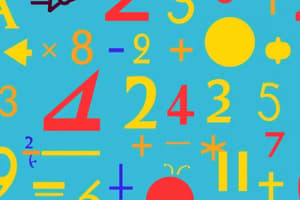Podcast
Questions and Answers
Match the description with the correct branch of mathematics:
Match the description with the correct branch of mathematics:
Trigonometry = Relationships between angles and sides of triangles Statistics = Collection, analysis, and interpretation of data Logic = Study of reasoning and argumentation Number Theory = Study of integers and integer-valued functions
Match the following branches of mathematics with their description:
Match the following branches of mathematics with their description:
Arithmetic = Basic numerical calculations Algebra = Symbols to represent numbers and quantities Geometry = Properties and relations of shapes Calculus = Study of continuous change
Match the following types of mathematics to their description:
Match the following types of mathematics to their description:
Topology = Properties preserved under continuous deformations Discrete Mathematics = Deals with discrete structures Mathematical Analysis = Rigorous study of calculus Numerical Analysis = Algorithms for numerical approximation
Match the following branches of applied mathematics with the fields they apply to:
Match the following branches of applied mathematics with the fields they apply to:
Flashcards
Mathematics
Mathematics
The abstract science of number, quantity, and space. It provides a foundation for solving real-world problems across various disciplines.
Arithmetic
Arithmetic
The oldest and most elementary branch of mathematics dealing with numerical calculations like addition, subtraction, multiplication, and division.
Algebra
Algebra
A branch of mathematics that generalizes arithmetic by using letters or symbols to represent numbers and quantities in formulas and equations.
Geometry
Geometry
Signup and view all the flashcards
Statistics
Statistics
Signup and view all the flashcards
Study Notes
- Mathematics is the abstract science of number, quantity, and space
- It may also be defined as the science of structure, order, and relation that has evolved from elemental practices of counting, measuring, and describing the shapes of objects
- Mathematics is used throughout the world as an essential took in many fields, including natural science, engineering, medicine, finance, and social sciences
- Applied mathematics concerns itself with the use of mathematical tools to solve problems in natural science, engineering, medicine, finance, and social sciences
Arithmetic
- Arithmetic is the oldest and most elementary branch of mathematics
- It deals with numerical calculations, including addition, subtraction, multiplication, and division
Algebra
- Algebra is a branch of mathematics that generalizes arithmetic
- It uses letters or other symbols to represent numbers and quantities in formulas and equations
- Includes solving equations and studying abstract structures like groups, rings, and fields
Geometry
- Geometry is concerned with the properties and relations of points, lines, surfaces, solids, and higher dimensional analogs
- Includes Euclidean geometry (plane and solid), analytic geometry, differential geometry, and topology
Trigonometry
- Trigonometry studies relationships between angles and sides of triangles
- Used to calculate distances and angles in various fields like surveying and navigation
Calculus
- Calculus is concerned with the study of continuous change
- Divided into differential calculus (rates of change and slopes) and integral calculus (accumulation of quantities and areas)
- Fundamental tool in physics, engineering, and economics
Statistics
- Statistics is the study of the collection, analysis, interpretation, presentation, and organization of data
- Used to make inferences and predictions about populations based on samples
- Includes descriptive statistics, inferential statistics, and probability theory
Logic
- Logic is the study of reasoning and argumentation
- Provides a formal framework for constructing valid arguments and proving theorems
- Important in computer science and philosophy
Number Theory
- Number theory is a branch of pure mathematics devoted primarily to the study of the integers and integer-valued functions
Topology
- Topology is concerned with the properties of geometric objects that are preserved under continuous deformations, such as stretching, twisting, crumpling, and bending, without tearing or gluing
- Studies properties of space, connectivity, and continuity
Discrete Mathematics
- Discrete mathematics deals with mathematical structures that are fundamentally discrete rather than continuous
- Includes combinatorics, graph theory, and set theory
- Important in computer science and cryptography
Mathematical Analysis
- Mathematical analysis is a branch of mathematics that deals with the rigorous study of calculus and related topics
- Includes real analysis, complex analysis, and functional analysis
Numerical Analysis
- Numerical analysis is the study of algorithms that use numerical approximation for the problems of mathematical analysis
- Used extensively in engineering and scientific computing
Applied Mathematics
- Applied mathematics is a branch of mathematics that concerns itself with the application of mathematical knowledge to other fields
- Includes mathematical modeling, optimization, and control theory
Mathematical Physics
- Mathematical physics is the application of mathematics to problems in physics
- Involves developing mathematical models of physical phenomena and solving them using mathematical techniques
Financial Mathematics
- Financial mathematics applies mathematical methods to financial problems
- Includes pricing derivatives, managing risk, and optimizing investment strategies
Mathematical Biology
- Mathematical biology, or biomathematics, is an interdisciplinary field that uses mathematical tools to study biological systems
- Includes modeling population dynamics, biological processes, and spread of diseases
Game Theory
- Game theory is a mathematical framework for analyzing strategic interactions between rational agents
- Used in economics, political science, and computer science
Studying That Suits You
Use AI to generate personalized quizzes and flashcards to suit your learning preferences.




